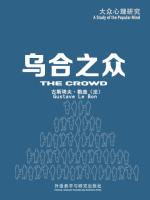202115015105
Title: The Psychology of Crowds: A Review of Gustave Le Bon's "The Crowd: A Study of the Popular Mind"
Gustave Le Bon's *The Crowd: A Study of the Popular Mind* is a seminal work that delves into the psychology of group behavior, offering profound insights into how individuals transform when they become part of a crowd. Published in 1895, this book remains a foundational text in the fields of social psychology and sociology, exploring the dynamics that drive collective behavior and the impact of crowd mentality on society.
Le Bon's central thesis is that individuals in a crowd lose their sense of personal responsibility and individuality, leading to a collective mind that operates on a more primal and emotional level. He argues that this phenomenon results in behaviors and actions that individuals would not typically engage in when alone. According to Le Bon, crowds are driven by unconscious impulses, which makes them highly suggestible and capable of both great heroism and extreme violence.
One of the most compelling aspects of Le Bon's work is his exploration of the mechanisms of crowd influence. He identifies several key factors that contribute to the power of the crowd, including anonymity, contagion, and suggestibility. Anonymity provides individuals with a sense of invulnerability, freeing them from the constraints of social norms and personal accountability. Contagion refers to the rapid spread of emotions and behaviors through the crowd, much like a virus. Suggestibility highlights the crowd's susceptibility to influence, often leading to irrational and impulsive actions.
Le Bon's analysis extends beyond the immediate behaviors of crowds to examine their broader societal impacts. He suggests that leaders who understand the psychology of crowds can harness their power for various purposes, whether for political mobilization, social movements, or even manipulation. His insights into the role of rhetoric and imagery in influencing crowd behavior have been particularly influential, highlighting the importance of charisma and symbolic communication in leadership.
While Le Bon's work has been praised for its pioneering insights, it has also faced criticism. Some critics argue that his portrayal of crowds is overly negative and deterministic, failing to account for the positive and constructive aspects of collective action. Additionally, modern advancements in psychology and sociology have provided more nuanced understandings of group dynamics, which sometimes challenge Le Bon's conclusions.
Despite these criticisms, *The Crowd: A Study of the Popular Mind remains a crucial text for anyone interested in the psychology of groups and the impact of collective behavior on society. Le Bon's observations continue to resonate in contemporary discussions of political movements, social media dynamics, and mass behavior, demonstrating the enduring relevance of his work.
In conclusion, Gustave Le Bon's *The Crowd: A Study of the Popular Mind offers a thought-provoking examination of the psychological underpinnings of crowd behavior. Its exploration of the loss of individuality, the power of suggestion, and the societal implications of collective action make it a timeless and essential read for students and scholars of social psychology, sociology, and political science.
This review emphasizes the lasting significance of Le Bon's insights into crowd psychology and underscores the relevance of his work in understanding contemporary social phenomena.



 京公网安备 11010802032529号
京公网安备 11010802032529号